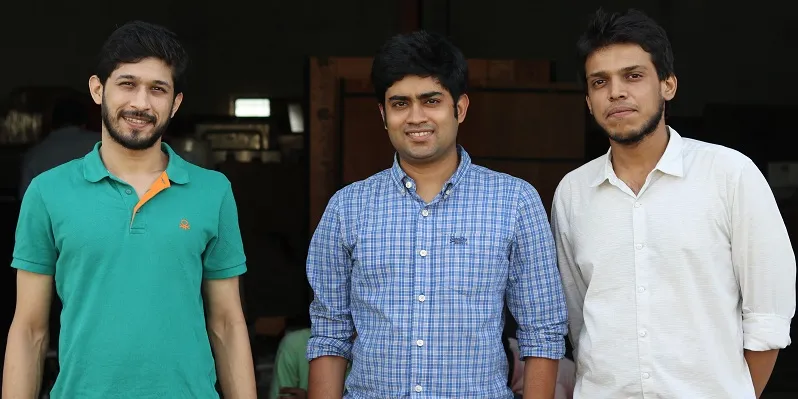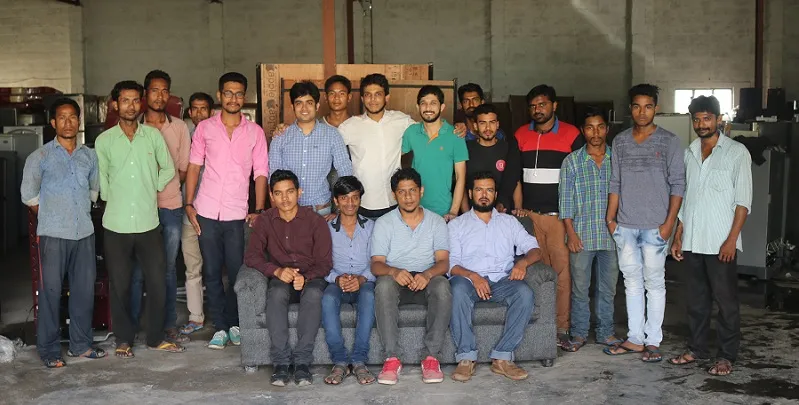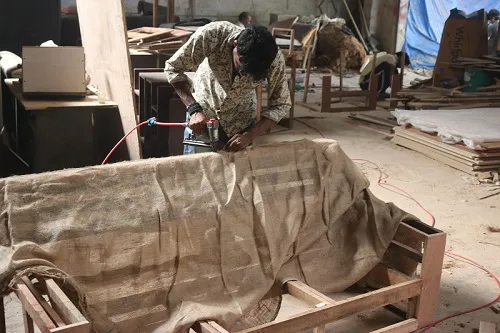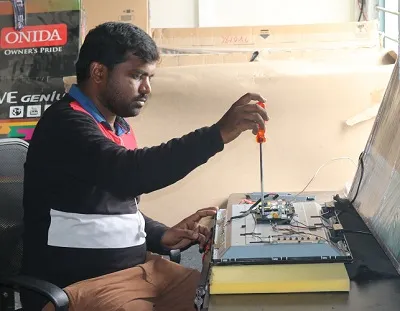This startup impressed K-Start with new strategies, got funding, and became profitable in 1 year
Three-year-old Guarented, which provides furniture and electronic appliances for rent and sale in Bengaluru, is eyeing expansion to Pune and Hyderabad for renting, and Tier II cities for selling refurbished goods.

At a glance
Startup: Guarented
Founders: Abhimanyu Dikshit, Prateek Agarwal, Harshwardhan Raikwar
Year it was launched: 2015
Where it is located: Bengaluru
Sector: Ecommerce/rental
Problem it solves: Rental and retail of refurbished goods
Funding: Rs 3.7 crore
Three 29-year-olds – Abhimanyu Dikshit from Varanasi, Prateek Agarwal from Delhi, and Harshwardhan Raikwar from Gondia – who graduated from IIT-Kharagpur in 2012, are building a startup, making a profit, and expanding with crowdfunding. Their venture is in the rental space, which already has a handful of players. But Bengaluru-based Guarented has a unique story along with a sustainable business model.
Work brought Harsh and Abhimanyu to Bengaluru after graduation. Harsh has worked at Accenture and Capillary Technologies, while Abhimanyu built his own startup in data analytics, Retention.ai, which was later acquired by content distribution app InShorts.
But their CV credentials did not help them when it came to house hunting in the country’s IT capital. Nobody would trust the bachelors with their electronic appliances or furniture. So the duo bought them all online at a discount, sharing the expenses. When their friend had to move out, there was confusion on how to split the money they had paid for the items, and how to share with a new roommate. They figured that renting would make more sense. (This was a time when Bengaluru-based rental market leader Furlenco was focused on renting furniture, not appliances, and Rentomojo was serving only in Mumbai.)
Harsh and Abhimanyu had a chat with their friend Prateek, who was then working with Futuresfirst in Delhi. The trio, who had always wanted to start up, had found the perfect opportunity, and Guarented was born.
With Rs 20 lakh investment from their savings, the trio started with four appliances – fridge, microwave oven, TV, and washing machine. “We figured these were the most essential items for young bachelors. They could manage without furniture,” Harsh says.
A new appliance would become old after the first time it was rented out to a user. Also, they had limited money; the three co-founders decided to buy pre-owned goods and refurbish them. Wanting to build good traction before raising funds, they procured the supply from local dealers at a good price and started renting them out via the Guarented website.
The three-member team worked out of Harsh's house for 10 months, even doing deliveries themselves. With limited marketing through Facebook and Google ads at Rs 500 per day, they managed to get 100 orders in the first month of operations. In five months, Harsh claims, they had 500 customers.
But renting is a capital-intensive business, and they soon ran out of capital.
“Raising debt was not possible then, as we had just incorporated the company. After a lot of brainstorming, we decided to go the crowdfunding way,” Harsh tells YourStory.
With this model, they were able to attract investments in small amounts from their network –starting with Rs 5 lakh from Prateek’s earlier boss Arun Kumar (Founder of MagicTiger). Guarented would buy products on these investors’ behalf, not the company’s. The agreement was to give them 24 percent annual returns, despite the business’ performance. (Today it is 20 percent) This model helped them raise money fast.

Winning the jackpot
Guarented’s first equity funding was in April 2016 from Aneesh Reddy, who was Harsh’s boss at Capillary Technologies and senior at IIT. Guarented was making Rs 5 lakh in monthly revenue then. But they needed even more capital to meet the demand-supply balance.
VC firm Kalaari Capital’s seed fund initiative Kstart was inviting applications at the time. Guarented’s application found luck.
“Kalaari Capital MD Vani Kola was impressed that we had figured out how to raise more money and had come up with the crowdfunding idea ourselves. She knew that we had invested everything ourselves. So although we asked for Rs 3 crore, we got Rs 3.5 crore,” Harsh recounts.
Soon, Guarented became a team of 12 people across operations, tech, and marketing, and moved to an office space. As the customer base grew, by 2017, Guarented started renting out furniture in addition to electronic appliances.
Highly funded startups like Furlenco and Rentomojo, along with younger startups like GrabOnRent, CityFurnish, Rentickle, Rentezee, and Voko, have already dug into the furniture rental space. But Guarented’s USP lies in refurbishment.
“We do it in-house, as our core capability. We have our own vendors for spare parts, and our own carpenters and technicians from Rajasthan and Gondia. We train them, and their new skills improve their salary too,” he says.

Guarented has benefited from Flipkart and Amazon running exchange offers in which customers can buy new appliances in return for their old ones. Since the two companies will want to get rid of excess inventory, they sell it to Guarented in huge volume – like 300 washing machines at Rs 900 each.
“We refurbish TVs, washing machines, sofas etc; the output is ready to ship. We disinfect mattresses with UV lights and use vacuum cleaners, and even provide brand new ones if demanded,” Harsh adds.
Rent to own
The rental category targets fresh graduates and professionals staying with friends in the 21-27 age group. But those above that age group prefer owning to renting. Also, for a normal bed or sofa, if you pay Rs 1,000 in rent for a month, you end up paying about 70 percent of the selling price in two years. So you might as well have bought this item from an online marketplace, especially as most ecommerce companies also provide EMI options.
To give its customers more options, Guarented launched the “rent-to-own” service last year. It assures a buy-back option for these goods within a year of purchase. “Consumers can rent for a few months and buy the items afterward if they want. Once the consumer is sure of owning it, we give them a good price, after deducting the amount already paid in rent,” Harsh says.
Currently, Guarented manufactures (at their own manufacturing unit) only functional furniture like sofa, beds, and dining tables, for paying guests and single people, and provides them at half the market price. They sell on Flipkart and Amazon as well. In May 2018, selling and renting both contributed equally to their revenue.

However, differentiation is the key in online retail. There is a greater probability of existing products/models being purchased than rented. So your product should be unique, and not available anywhere else. This is why Guarented plans to design convertible furniture like table which can become wardrobe, a double bed which can become a compact, single one, etc.
Step by step
Currently, Guarented only does digital marketing to build conversion. “We invest only where we can see direct ROI. We may do brand awareness campaigns after raising Series A funding,” Harsh says. He adds that since Facebook ads include geo-targeting, Guarented has seen interest from customers in Tier II and III towns around Bengaluru – proving the demand that exists for (purchase of) refurbished goods outside metro cities. “This is an untapped market we want to explore,” Harsh adds.
Additionally, Guarented is partnering with home rental and co-living startups like Nestaway, Zolo, and Stayaboard, in Bengaluru. They will provide refurbished furniture and appliances for their use.
Guarented also sells refurbished products on online classifieds platform Quikr bazaar. “We are the only vendors on their platform for Quikr-certified furniture and appliances. We plan to tap Quikr for sourcing of pre-owned products; this way, we can scale supply,” Harsh tells YourStory.
In May 2018, Guarented generated Rs 70 lakh in revenue, and turned operationally profitable. To keep up with positive unit economics, Guarented follows a strict ‘No discounts’ policy. “We may give a small discount of one month’s service free for long-term tenures, like 10 months. We don’t want to give discounts that will eat into our profit,” Harsh says.
Also, since they procure in bulk at low prices, Harsh claims that the cost of holding inventory of raw materials is low. “Currently we have only 20-25 designs in furniture. Also, our contractors are not our employees with a fixed pay. We enable them to be entrepreneurs; it makes them more efficient and brings down costs,” Harsh says.
What next?
Guarented aims to build a solid, successful business model in Bengaluru before expanding to other geographies. Their target cities are Pune and Hyderabad for renting, and Tier II cities for selling of refurbished goods.
Crowdfunding continues to bring great capital to Guarented. In fact, Harsh claims that their returns have been so good that sometimes they have to request the interested parties to wait.
Including the blue collar workforce, Guarented is now a team of 60 people. They outsource transport needs to third-party players.
Having served 5,000 houses so far, Guaranted hopes to be present in 20 cities and be overall profitable by 2021 with Rs 20 crore monthly profit. In FY 2018, Guarented witnessed 20 percent monthly revenue growth. Their gross margin is 40 percent and net margin is 20 percent.
According to PricewaterhouseCoopers, the market for furniture renting in India is worth $800 million-$850 million and that for electronic appliances is at $500 million. Guarented’s path is clear. It is closing its Series A round of funding now, and plans to use the fresh capital to setting up a manufacturing unit and put other processes in place. For FY2019, Guarented is aiming high – it wants to achieve 30 percent monthly growth in revenue.







